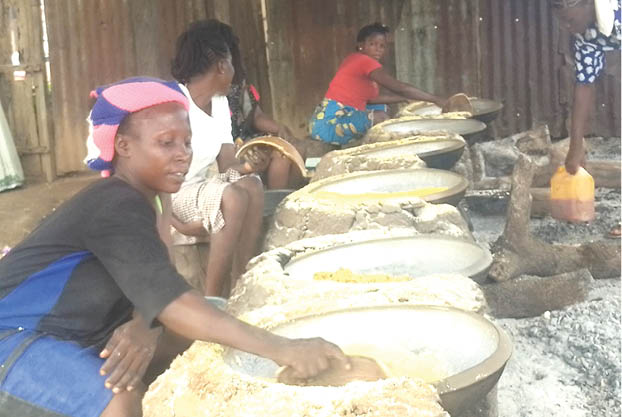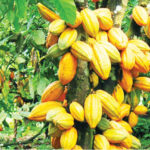Mayo Selbe is a town in Gashaka Local Government Area of Taraba State. It is situated at the foot of the Mambilla Plateau Mountain and is a gateway to the famous Mambilla Plateau tourist attraction in Sardauna Local Government Area.
The road from Jalingo-Bali-Serti Gembu passes through Mayo Selbe town.
The locals are mainly farmers and they produce cocoa and cassava, as well as other crops.
Cassava, which is one of the main farm products in the community, has made garri processing prominent among residents of the town.
- Turaren wuta: Pleasant fragrance of the North
- A peep into the life of prominent Nigerian banker, boardroom guru, Abdul Mutallab
In every household in the town, garri is produced in commercial quantity; which is why Mayo Selbe has become a hub for garri processing in Taraba State.
Weekend Trust’s visit to the town revealed how garri processing has provided a means of livelihood for almost every member of the community, especially women and the youths.
Williams Shuidon, a resident and younger brother to the paramount ruler of the town, took our correspondent to several houses where raw cassava was being processed into either yellow or white garri.
Small and medium sized cassava grinding machines are installed in almost all the houses, as well as locally-made cassava drying equipment.
The cassava root, after being ground, is put in sacks and loaded unto a wooden stand or hydraulic press machine to strain water out of it.
All the processes are done manually except for the grinding. The grinding machines used in the town are small, but they are many because almost every household can boast of one.
In many households visited, there are about five to 10 big pots used for frying garri. However, some individuals own up to 20 frying pots and women bring their dried cassava to fry for a fee which is charged per bag of garri.
Garri processing is a daily activity in all the households across the town and the industry offers employment opportunity to married women, men and youths in the town.
Mr Joel Chama has a garri processing centre in Mayo Selbe.
He uses a house located along the main road leading to Gembu as processing, drying and frying centre.
Chama, a Kilba from Hong in Adamawa State, told Weekend Trust that he has been in the garri processing business for over ten years.
“My elder brother who served as a police officer in Mayo Selbe brought me here and before his retirement, l discovered that people were making good money from garri processing and that was why l ventured into the business,” he said.
He said garri processing requires little capital. According to him, cassava root is the main item used and there are lots of cassava farms in the state. He said both cassava and a small working capital could be obtained on loan from individuals to start the business, adding that a lot of women invest the proceeds from their farm in the business.
Chama explained that at his processing centre, there’s a presser machine which is essential for garri processing, 20 frying pans as well as a big space for drying the fried garri, which is the last stage in the process.
He hires about 25 people, mostly women, who engage in peeling the cassava and frying it.
Another garri processor, Lorance Lewe, told Weekend Trust that he has been in the business for 12 years, and majority of the residents depend on it for their income.
According to him, land in Mayo Selbe and surrounding villages is suitable for cassava production and the inhabitants take advantage of availability of cassava to process the garri, which has now become a major source of income.
Mr Lewe said “In the past, most households only processed garri for their domestic use. However, with the availability of cassava, we gradually began to produce for sale and because of the quality of our garri, people started patronising us and Mayo Selbe garri became popular.
“In every household, garri is produced either in commercial or small quantity for domestic use, and that is why people from different places come here to buy garri,” he said.
Lewe said some women groups have formed themselves into multi purpose cooperative groups and are producing garri in commercial quantity for sale to customers from within and outside Taraba State.
Hassana Musa is the leader of one of the multi purpose cooperative groups.
She said initially, the women were producing individually but a non governmental organization called, Africa Nature investors (ANI) working with the Gashaka Gumti National Park organised them into multi purpose cooperative groups and provided them with interest-free loan.
She said in Mayo Selbe, there are four multi purpose cooperative groups namely Cigaba multi-purpose cooperative; Alheri; Hadinkai and Nasara multi purpose cooperative group.
Hassana stated that the production capacity of the groups, which have over 140 women, has increased over the years and so has their income.
She said savings and loan scheme was also introduced through the coordination of ANI and each woman contributes a certain amount of money from the proceeds of garri which is provided to other members as revolving loan.
She explained that members of the groups have benefited so much from the support of ANI, especially economic empowerment, and as a result many have ventured into other economic activities and are making more profit.
Another leader of one of the four multi purpose cooperative groups, Francisca Nje, also revealed that the women are top beneficiaries of the garri processing business, which is a major industry in the town, because of their number.
She said garri processing is a daily activity which almost every woman in the area is involved in one way or the other, but the most important thing is that the industry has offered good source of income to women in the town.
She commended Africa Nature investors (ANI) for providing interest-free loan to the women which further encouraged them to expand their economic activities.
She said the demand for garri by customers from different parts of the country has prompted them to expand their daily production, adding that the cooperative groups need bigger cassava grinding machines which will aid them to increase their production capacity.
She appealed to ANI to provide additional loan to the women groups to enable them buy industrial cassava grinding machines and drying machines in order to meet daily demands.
Mr David Peter, ANI community liaison officer, told Weekend Trust that N30million interest free loan was granted to the multi purpose cooperative groups as incentive to enable them embark more on garri processing and other agro processing businesses.
He said ANI has supported over 1400 women groups under its livelihood project and that women groups are the main target.
He said apart from garri processing, women were also supported in Shea butter production, rice milling and beekeeping. Further findings revealed that both women and men are taking the opportunity presented by the high demand for garri to trade in the product within and outside Mayo Selbe.
The product is sold and distributed in towns in Taraba, Bauchi, Gombe, Jigawa, Yobe and Kano states.
Lami Adamu, a garri trader, told Weekend Trust that she’s been in the business for two years and every month, she makes a profit of between N150,000 and N200,000.
Lami stated that initially, she used to buy five to seven bags of garri and transport to Garba Chede, Mutum Biyu, Serti and Jalingo towns for sale but later started transporting garri to Gombe, Birnin Kudi, Darazu in Gombe and Jigawa states as well.
Weekend Trust gathered that despite massive cassava farming in Mayo Selbe, there is no cassava flour industry and all the cassava produced in the area is used for only garri, while the process of producing garri is still manual.
The paramount ruler of Mayo Selbe chiefdom, Yarima Thomas, said his subjects are hard working and also into various profitable ventures like cocoa, cassava, farming and garri processing.

 Join Daily Trust WhatsApp Community For Quick Access To News and Happenings Around You.
Join Daily Trust WhatsApp Community For Quick Access To News and Happenings Around You.


